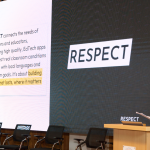May 17, 2021
Brett explores both the benefits of social professional learning and also the potential pitfalls

In an ever-changing world of social integration, many teachers have adopted technologies that expedite their professional learning. The concept of ‘just in time learning’ has now taken on a new ‘literal’ meaning. Whenever you need to know something you simply need to pull out the device from your bag or pocket and search for the appropriate information.
Professional learning on social media provides teachers with the ability to share knowledge and resources, network and be an authentic part of a Professional Learning Community. This allows accessibility to information that may have been limited due to geography, financial situations or the employment status of a teacher. Using social media as a professional learning tool means knowledge is shared democratically and equally amongst all people.
Having professional learning occurring on social media means that all teachers who are active online can enrich their knowledge and skills and improve their teaching ability. As a result, this impacts on and improve the performance of, the students in our care.
Using social media as a professional learning tool will never replace formal professional learning interactions however it can enhance them and become an invaluable optional extra that strengthens the quality of the teaching profession.
One of the most significant benefits of using social networks and online communities of practice is that it offers you the time to consider the content and to reflect on your own practice and learning.
Teachers also get to have agency over what they learn. By curating a personalised Professional Learning Network (PLN) teachers find like-minded colleagues with who they can share and learn from.
Despite all of the positives, there are dangers that teachers need to be aware of when going online and engaging publicly on social media in a professional capacity.
When posting online using any platform teachers need to be mindful of their digital footprint. Colleagues, school administrators, parents and even students may be able to find and read what you have shared. It is important to be mindful of what you post knowing that anyone can read it. A teacher should at all times be courteous, respectful and always professional when interacting with others online. Teachers should also be cautious regarding any privacy issues, aware of the local laws as well as the policies of their employers.
Furthermore, any materials or resources should also be verified and checked for quality control. You would never want to put yourself in a position where you are using copyrighted material or resources that of a poor quality. Equally, ensure that advice regarding pedagogy is evidenced-based and comes from a reputable source or institution.
RECOMMENDED: https://global-edtech.com/category/community/
When establishing a social media presence, it is always good practice for teachers to create a professional account that is separate from your personal life. Don’t be afraid you give authentic insights into who you are, social engagement means being authentic and establishing true relationships but be aware that your video of Uncle Bob at the family barbeque or late-night pics from your cousin’s Bridal Shower may not come across as professional. Your personal privacy is also important when you engage professionally online.
Remember to be classy.
Thank others for their help, welcome new teachers and when sharing resources and materials always remember to cite where they originally came from.
For the most part, the online education networks are warm, supportive professional environments that can provide a plethora of professional learning opportunities. No matter what your preferred platform is, whether it is the fast pace of Twitter, the professionalism found on LinkedIn, the community on Facebook or the visuals seen on Instagram you will be able to locate a supportive network of teachers that exist in this beautiful global staffroom that is social media.










0 Comments